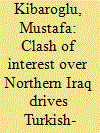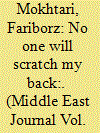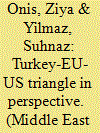| Srl | Item |
| 1 |
ID:
061703


|
|
|
|
|
| Publication |
Spring 2005.
|
| Summary/Abstract |
Turkey and Israel enjoyed an almost perfect relationship throughout the 1990s that amazed their friends, yet bothered their rivals. The US war in Iraq revealed, however, that the two longstanding allies did indeed have contradictory objectives and concerns with respect to the future restructuring of Iraq. While Turkey fears the emergence of an independent Kurdish state in northern Iraq, the same possibility seems favorable for Israel from its security standpoint, vis-à-vis threats posed by countries like Iran, Pakistan, and beyond. It appears that the “amazing alliance” is heading toward a crossroads. Such an eventuality may change the nature of the relationship from a “win-win” to a “lose-lose” situation unless proper steps are rapidly taken with a view toward rebuilding confidence on both sides.
|
|
|
|
|
|
|
|
|
|
|
|
|
|
|
|
| 2 |
ID:
061702


|
|
|
|
|
| Publication |
Spring 2005.
|
| Summary/Abstract |
The Palestinian state remains an internationally endorsed project, yet an increasingly difficult one to implement. By analyzing the territorial, legal, and demographic developments that took place in the West Bank and the Gaza Strip over the past ten years, this article assesses the extent to which the prospective Palestinian state has become unattainable. A comparison between the South African apartheid experience and the Israeli-Palestinian conflict is made to shed light on the ways in which the Palestinian territories are becoming analogous to Bantustans. While historical comparisons are never exact or prescriptive, they raise interesting parallels whose implications need to be considered, if not altered, in any attempt to materialize the project of viable Palestinian independence.
|
|
|
|
|
|
|
|
|
|
|
|
|
|
|
|
| 3 |
ID:
061700


|
|
|
|
|
| Publication |
Spring 2005.
|
| Summary/Abstract |
Iraq’s experience with chemical weapons provides ample lessons for nation-states looking to redress their conventional military shortcomings. Nation-states are likely to learn from Saddam that chemical weapons are useful for waging war against nation-states ill-prepared to fight on a chemical battlefield as well as against internal insurgents and rebellious civilians. Most significantly, nation-states studying Iraq’s experience are likely to conclude that chemical weapons are not a “poor man’s nuclear weapon” and that only nuclear weapons can deter potential adversaries including the United States.
|
|
|
|
|
|
|
|
|
|
|
|
|
|
|
|
| 4 |
ID:
061701


|
|
|
|
|
| Publication |
Spring 2005.
|
| Summary/Abstract |
Iranians support a policy of deterrence because their perception of Iran’s security is colored by historical experiences. For Iranians, geopolitical realities together with national psychology define national security. This article attempts to explain the national psychology, and in doing so point to a path of US-Iranian policy convergence. The United States should avoid making the mistake Britain made in 1951, making an oil royalty issue a matter of national pride for Iranians. The current nuclear dispute could turn into an object of Iranian national pride, liberty, and independence. The question of whether a nation without access to a nuclear fuel cycle could be anything other than a dependent consumer has already been posed.
|
|
|
|
|
|
|
|
|
|
|
|
|
|
|
|
| 5 |
ID:
061704


|
|
|
|
|
| Publication |
Spring 2005.
|
| Summary/Abstract |
This article examines the delicate dynamics of the triangle of Turkey-EU-US relations. While acknowledging the role of the United States in promoting close links between Turkey and the EU, this study underlines the limits of American influence on EU decision-making on issues concerning “deep integration.” In this context, the future of this triangular relation depends on the interplay of contending forces in Turkey’s domestic political arena as well as the dynamics of trans-Atlantic relations in the international scene.
|
|
|
|
|
|
|
|
|
|
|
|
|
|
|
|